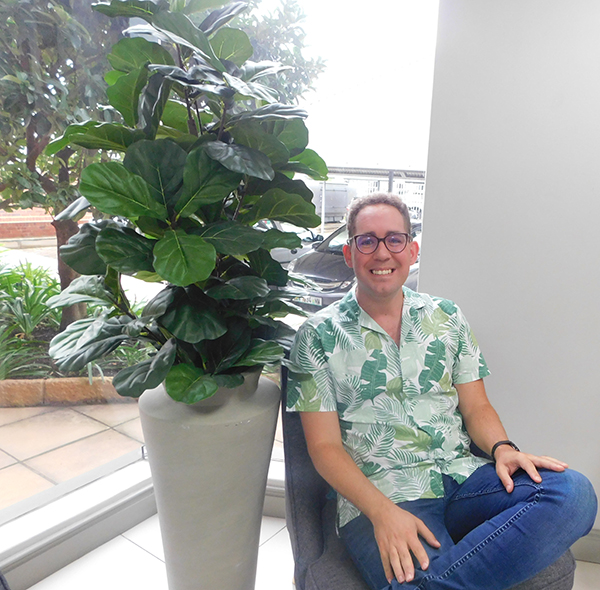"Doing my PhD was an almost indescribable journey with many ups and downs that all contributed to making it an overall enriching experience. There is no denying all the (many) times giving up was the only thought in my mind, just as there’s no denying the affirming moments I felt like I am exactly the right person for this study. I feel motivated to build my future one present moment at a time."
These enthusiastic words belong to Dr Benito Trollip, SADiLaR's digital humanities researcher in Afrikaans at the South African Centre for Digital Language Resources (SADiLaR) at the North-West University (NWU). He will be conferred the Doctor of Philosophy in language and literature with Afrikaans and Dutch at the NWU in June 2023.
"My thesis, titled 'Morfologiese evalueringskonstruksies in Afrikaans' [Morphological evaluative constructions in Afrikaans], is focused on the specific ways in which evaluation is expressed in Afrikaans, specifically on a morphological level.”
Dr Trollip explains that morphological evaluative constructions (MECs) is an overarching term that is used to refer to evaluative constructions, for example, intensified adjectives and taboo infixes.
“The research questions addressed in this study are what a descriptive framework for MECs should include; which MECs are used in Afrikaans; and ultimately how these constructions should be described with reference to usage data."
According to Dr Trollip, the description of Afrikaans MECs, whether theoretically or by means of synchronic corpus data, has not yet been undertaken in its totality before, thus making this study the first of its kind for Afrikaans.
“My thesis describes different Afrikaans MECs that have either previously not been described at all, or in any detail, or have not been described using corpus data, or have enjoyed attention a number of decades ago. In a linguistic sense, a construction is any form-meaning pair like yellow – the form is the letters and sounds and the meaning is that it is a particular colour on the visible colour spectrum,” he explains.
“The specific constructions I was interested in are those that do not necessarily have a straightforward meaning like yellow, but those that had ‘extra’ meaning. An Afrikaans example is the intensified adjective goudgeel (literally gold yellow or, more accurately, very yellow). The construction’s meaning in Afrikaans is only ‘very yellow’ – the use of goud (gold) in the word is limited to the emphasis of the ‘very’ yellow colour and not literal in the sense of the possible comparative relationship between the colour and the precious metal. This can be contrasted with bottergeel (butter yellow or yellow like butter) and sonneblomgeel (sunflower yellow or yellow like a sunflower) that refer to specific shades of yellow, that are not ‘very yellow’.”
Another example of a component that has been successful in taking the meaning of ‘very’ on in many MECs, is dood (dead). “Examples are doodeenvoudig (dead simple or very simple), doodeerlik (dead honest or very honest), and doodmaklik (dead easy or very easy),” Dr Trollip continues. “My study involved looking at these and other constructions and describing them and their use in written Afrikaans as it is represented in the corpus collections of the Virtual Institute for Afrikaans.”
He decided to do his PhD in this particular study field as it felt like the natural next step for him. “Even though I have a lot of interests, for this particular degree I felt my interest aligned perfectly with my aptitude and appetite for Afrikaans morphology.”
It did, however, come with some challenges, most of which had to do with understanding the topic and making it his own.
“Sometimes I wasn’t sure whether I understood what I was doing at all, so the main challenge was to trust the process and my abilities. I have to give a shout out to my promotor, Prof Gerhard van Huyssteen. He was there to motivate and contextualise the situation and he had this self-evident belief in my abilities that I doubted often.”
Dr Trollip is full of gratitude for the opportunity he has had to contribute to the furthering of linguistic knowledge on and in Afrikaans. “I can’t express the immense honour and privilege I feel for the opportunity I had to write this (very long) love letter/thesis for and in my own language.”
Asked about his aims and dreams for the future, Dr Trollip answers: “Quite honestly, I am just trying to enjoy the moment, and I am exploring new dreams. This dream has been years in the making and I don’t want to rush into something new. If I can keep contributing to furthering Afrikaans linguistic knowledge, I will be happy.”

Dr Benito Trollip is elated to obtain his PhD in language and literature later this year.
